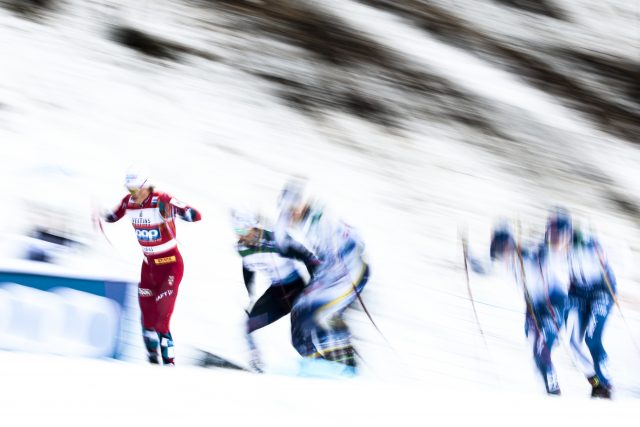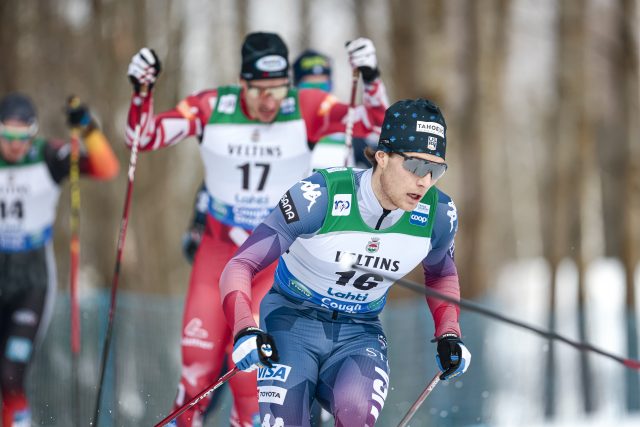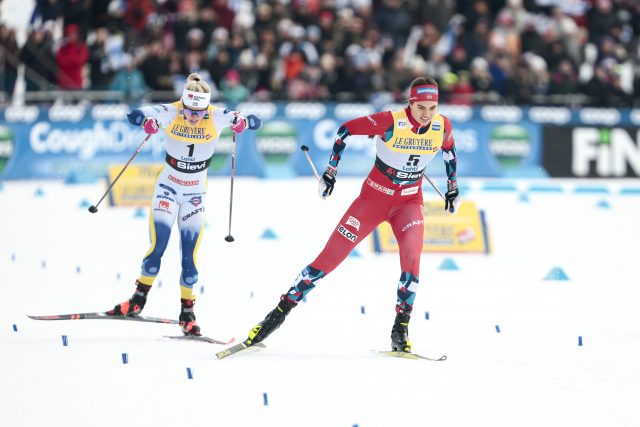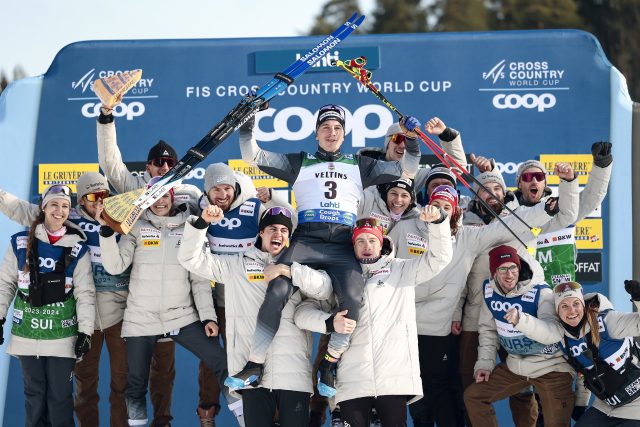 This coverage is made possible through the generous support of Marty and Kathy Hall and A Hall Mark of Excellence Award. To learn more about A Hall Mark of Excellence Award, or to learn how you can support FasterSkier’s coverage, please contact info@fasterskier.com.
This coverage is made possible through the generous support of Marty and Kathy Hall and A Hall Mark of Excellence Award. To learn more about A Hall Mark of Excellence Award, or to learn how you can support FasterSkier’s coverage, please contact info@fasterskier.com.

The World Cup season has definitely gotten long, and the edges are beginning to fray. The FIS World Cup points system favors those who race the most, but the season is just too long, too challenging, and filled with too much travel for most skiers to make it cleanly and handsomely to the year’s end. Cross-country skiing is an exhausting sport—nowhere more so than for competitors in the FIS World Cup. Over the weekend at the Lahti Ski Games, some of the very best among World Cup contenders are beginning to appear a bit ragged.
With Jessie Diggins (USA) failing to qualify for the Sprint heats, Linn Svahn (SWE)—Digggins’ primary rival in the race for the season-long World Cup Overall crown—seemed poised to make up serious ground in their season-long race. Ironically, Svahn—who dominated Sprint events through the first half of the season—appeared decidedly un-sprinty today, finishing fourth; good enough to eat into Diggins’ points lead, but not with as big a bite as Svahn might’ve hoped.
“It’s not a secret that we missed the glide this weekend in a way that critically impacted results,” commented Diggins. “But it’s important to know that everyone is working their hardest, doing the best they can in each moment and ready to learn and improve. Today was heartbreaking in the moment for me, but also a chance to learn and improve on how to deal with a really tough day. My focus doesn’t change from how I handle a good day; I evaluate the race, take lessons and notes on it and then move forward.”
Hoping to translate her fast qualifying into additional points in the race for the Overall World Cup, Frida Karlsson (SWE) veered radically in the last turn before the finishing straight thus impeding Julia Kern (USA). As a result, Karlsson found herself disqualified from the quarterfinals. Kern’s quarterfinal result was moved up to third, though the time she lost behind Karlsson’s erratic maneuver may have prevented Kern from advancing as a lucky loser.
“What happened today has been happening a lot this season,” said Kern. “And it’s been super frustrating because the opportunity to advance can’t be given back. I know what I’m capable of, I know that my fitness and tactics are there, and I always try to ski a fair race. But in these situations, I can’t show that because I’ve been getting tangled up so often with certain athletes, making it impossible to advance. I think the Jury made the right decision today and that hopefully this sets a precedent for what is and is not clean and fair racing. I am believer that sprint racing should be aggressive and tactical, and yes, there will be crashes and tangles, but those are “race incidents” and part of racing. However, race incidents and deliberate maneuvers to obstruct other athletes are two separate things and I hope the Jury will continue to protect the fairness of the sport.”
Jonna Sundling (SWE) seemed determined to follow her race-from-the-front strategy that has seen her achieve remarkable success of late, but her Norwegian rival, Kristine Stavaas Skistad feasted on that strategy with a well-timed draft on the final downhill in their early heat—a strategy Skistad would continue to follow in the final, where she won easily over Maia Dahlqvist (SWE) in third and a remarkable Coletta Rydzek (GER) in second.
In the Men’s competition, Johannes Hoesflot Klaebo (NOR) and Lucas Chanavat (FRA) continued to prove that they possess more speed and tactical acumen than their rivals, finishing first and second on the day. Behind them came the career-best finish of third-place Valerio Grond (SUI).
Other regular Sprint contenders were not so fortunate. Erik Valnes (NOR) fought his way through a complex quarterfinal in which he had languished in the rear after an angry tangle with Michal Novak (CZE). Valnes has raced and raced and raced in pursuit of the Sprint and Overall rankings. It’s possilbe that such a come-from-behind necessity depleted Valnes, as he was eliminated in the subsequent semifinal. Though having possibly the best season of his career, Valnes continues to lose ground in both season-long contests.
Havaard Solaas Taugboel (NOR) became mired in mid-race crowding, finding himself eliminated in the quarterfinal. Federico Pellegrino (ITA) wove his way through a confusing semifinal to nip Joni Maki at the line; then Pellegrino seemed to have nothing left in the final. He finished fifth, again just ahead of Maki.

Canadians qualified Sonjaa Schmidt (22nd) and Pierre Grall-Johnson (16th) into the quarterfinals, where each were narrowly eliminated. They would finish 19th and 14th, respectively. Americans qualified four into the quarterfinals (Julia Kern, Sammy Smith, Rosie Brennan, and JC Schoonmaker), though none found themselves able to advance. Even so, Americans can be proud of their results on the day: Schoonmaker earned the top result in 13th, Kern 16th, Smith 23rd and Brennan 25th.
“Today was tough!” said Brennan. “I was feeling the race from yesterday and we were definitely struggling with our skis on the salted snow. After a less than ideal week, I just wasn’t feeling my best self and I’m not good enough at sprinting to make it happen when I’m not at my best.”
On-air commentators remarked that American skiers appeared flat this weekend in Lahti, attributing it to recent trans-Atlantic travel and post-Minneapolis let-downs. The Americans do seem to be learning that the World Cup season is long . . . and that the season does not conclude after the echos of loud cheering have faded in Minneapolis.
“[I] made a mistake going into the last hill by not owning my space and I got kind of swarmed by the other guys,” said Schoonmaker. “That’s a little frustrating but hopefully can learn from it. The conditions on the course were great. The snow held up really well which was nice because I was definitely a little worried we were going to have a slush party out there.”

Women’s Freestyle Sprint
The Lahti Freestyle Sprint course curls its way around the base of Lahti’s famous ski jump, creating a course that is highly tactical: not conducive to aggressive pace setting, and rewarding those who can master the draft on the final downhill, and slingshot into the finishing straightaway. The first heat included Sundling, Skistad, Brennan, and Jasmi Jonssu (FIN). With Sundling in the lead, the heat was typically fast, though Skistad showed her understanding of the tactics by easil gliding up to Sundling in the draft provided by the final downhill.
The headline semifinal included Sundling, Svahn, and Skistad who again demonstrated her mastery of Lahti course tactics by gliding forward to pass the entire field, and coasting to the semifinal win. Surprisingly, both Svahn and Sundling skied poorly in the semifinal, but found themselves advancing as lucky losers.
Dahlqvist, Sundling, Svahn, Skistad, Joensuu, and Coletta Rydzek (GER) contested the Women’s Final in which Svahn went immediately to the front (the Swedes seemingly oblivious to the ins and outs of Lahti’s Sprint course tactics). Svahn was followed closely by Skistad, and trailed at a distance by Sundling who, uncharacteristically, sat at the rear of the field. The Swedes appeared to lack their usual speed and pop, finding themselves easily bested by Skistad who etablished a draft-thwarting gap on the final downhill, and coasted easily to the win. The Swedes also surrendered second place to a beaming Rydzek who achieved her first World Cup podium result. Dahlqvist captured third place, ahead of Svahn in fourth and Sundling in fifth.
Women’s Freestyle Sprint RESULTS
Men’s Freestyle Sprint
The nature of Lahti’s course—favoring those who can accelerate quickly after the mid-course hairpin—made it appear unlikely that anyone would be able to best Klaebo. But Lahti’s Freestyle Sprint course is one that encourages alternative strategies, and many of those who are not as experienced may choose strategies that may confound those customarily found at the front. Klaebo found himself contesting a semifinal in which he was forced to race from the rear. Late in that heat, Chanavat chose a daring inside line on the final hairpin turn, skidding masterfully through the apex and stealing the lead for a moment before Klaebo shot past. The two dominant sprinters of the season advanced with counter-punching tactics and tremendous finishing speed.
Klaebo continues to be just plain amazing, having won the Team Sprint (with teammate, Paal Golberg) on Friday, then dominating the 20 k Classic Individual Start on Saturday (beating Classic specialist, Iivo Niskanen by 24 seconds). Then Klaebo shows up on Sunday showing absolutely no signs of fatigue to win the Freestyle Sprint. In the final, Klaebo baited Even Northug into taking the lead, then dusted him on the subsequent downhill to begin his surge to the finish line. Only Chanavat could come close to matching Klaebo’s speed as they coasted across the line first and second. Behind them, Valerio Grond (SUI) capped a career-best day by finishing third.
Men’s Freestyle Sprint RESULTS

John Teaford
John Teaford—the Managing Editor of FasterSkier — has been the coach of Olympians, World Champions, and World Record Holders in six sports: Nordic skiing, speedskating, road cycling, track cycling, mountain biking, triathlon. In his long career as a writer/filmmaker, he spent many seasons as Director of Warren Miller’s annual feature film, and Producer of adventure documentary films for Discovery, ESPN, Disney, National Geographic, and NBC Sports.



